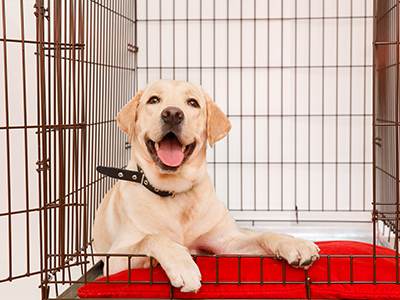
Puppy
If you just welcomed a new puppy into your home, you’re probably enjoying the cuteness overload, the waggly tail, and the new bond of friendship that will be there through thick and thin over the coming years.
But, you probably also have a lot of questions on your mind…
Which vaccines does your puppy need? Should they sleep in bed with you, or in a crate or bed of their own? And, where should you keep your puppy while you’re at work?
The following tips are a great place to start with a brand-new puppy…

One important thing to remember about puppies is, their immune systems are still developing.
Unfortunately, that means puppies are at a much higher risk than adults when it comes to dangerous infections and parasites…
But not to worry, because there’s a lot you can do to keep them healthy.
The most important thing is to keep your new puppy current on their visits and vaccines with your veterinarian.
Your vet will create a plan for your puppy and let you know exactly what they need. Here are some additional pointers that will help…
Come on time for all booster shots—most puppies need a series of vaccines, with boosters about 3-4 weeks apart, to get the full immune benefit.
Parasite prevention is very important for your new puppy—be sure to follow your vet’s recommendations.
Ask your vet when it’s safe for your puppy to go to places a lot of dogs visit, such as dog parks.
All of this will give your new puppy a great start in life, and keep their puppyhood healthy and fun!

Puppies have different nutritional needs than adults, since they’re still growing. Just like human children, you may notice they have fast growth spurts.
We offer specific puppy formulas optimized for this extremely important time period of your dog's life. Our blend of select proteins, high quality fats, and other wholesome ingredients are tailored to the unique energy and growth needs of puppies large and small.

If made comfortable from the beginning, a crate can become your puppy’s personal “safe space,” a place where they feel happy and secure. Choose one that's just large enough for your puppy to comfortably stand up, turn around and lie down.
Even as adults, the crate may be a place your pooch goes when they want a quiet moment (such as when noisy human kids are in the home), or for security during loud noises like storms or fireworks.
A crate can also help puppies develop a normal sleeping routine, since they will get used to sleeping in the same place each night. Plus, for puppies, a crate can really help with potty training.

“Puppy-proofing” your home may seem like a daunting task. However, you can make it easier by setting aside one specific place for your puppy when you can’t supervise them directly.
This could be their crate or a large playpen. It could also be a room inside the home, walled off with baby gates.
Having a safe play area ensures your curious pup won’t eat anything they shouldn’t be eating, won’t have potty accidents all over the house, and won’t chew up your favorite pair of shoes!

Most puppies can learn to go to the bathroom outside. However, it takes time to learn this new skill.
Also, keep in mind that many puppies have small bladders and active digestive systems, and therefore they can’t “hold it in” all day. So, there are bound to be a few potty accidents—that’s just a normal part of growing up.
Until they’re a little older, you can minimize the mess by giving them a specific potty spot to use—for example, in a corner of their crate or off to the side of their room or playpen.
From our family to yours,
Fromm Family Pet Food
You have signed up.